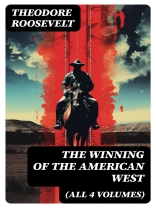In ‘The Winning of the American West, ‘ Theodore Roosevelt presents a compelling narrative that chronicles the complex history of the American frontier. Divided into four volumes, the work combines personal anecdote, rigorous historical analysis, and vivid storytelling, reflecting Roosevelt’s dynamic prose style. His depiction of the westward expansion encapsulates the triumphs and tribulations faced by settlers, Native Americans, and the evolving American identity during the 19th century. It is an evocative exploration of the intersection between individual initiative and national expansion, highlighting themes such as courage, conflict, and the spirit of adventure that characterize this pivotal era in American history. Theodore Roosevelt, the 26th President of the United States and a fervent advocate for American nationalism, was deeply influenced by his own experiences in the West. His extensive travels and firsthand encounters with the rugged American landscape and its inhabitants shaped his understanding of the frontier’s significance to American character and democracy. This work stands as both a historical document and a testament to Roosevelt’s belief in the inherent vitality of the American spirit, greatly influenced by his own challenges and triumphs in life. ‘The Winning of the American West’ is essential reading for anyone seeking to grasp the complexities of American expansion and identity. Roosevelt’s incisive insights and vibrant storytelling not only immerse the reader in the historical narrative but also provoke reflection on contemporary American values. This historical epic is a must-have for scholars, enthusiasts of American history, and general readers alike.
Sobre el autor
Theodore Roosevelt (1858–1919), the 26th President of the United States, was more than a revered statesman and politician; he was also a prodigious author and avid historian. Born into a wealthy New York family, Roosevelt was a dynamic individual driven by an insatiable desire for knowledge and adventure. Despite battling asthma and poor health in his youth, he adopted a strenuous lifestyle, which shaped much of his robust public persona. Roosevelt’s literary contributions extended to subjects like history, biology, and politics. His scholarly opus, ‘The Winning of the American West’ (1889–1896), encompassing all four volumes, provides an expansive narrative of the complex processes that led to the expansion of the American frontier. In this seminal work, Roosevelt combines diligent research with his distinctive narrative style, offering insightful perspectives on the settlement and admits the controversial implications of the United States’ expansionist practices. The book is notable for its detailed analysis and Roosevelt’s engagement with themes of bravery, violence, and the ethos of Manifest Destiny that defined that era. Roosevelt’s proclivity for detail and moral contemplation in his historical writings has cemented his legacy as much more than a former President: he is recognized as a significant figure in the American literary and historical landscape (Morris, 1979; Brands, 2001).












